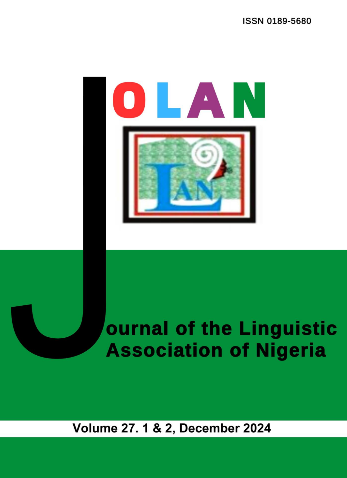Exploring pragmatic implications of artificial intelligence on language, learning, and knowledge construction: The case of Hausa
DOI:
https://doi.org/10.60787/jolan.vol5no1.419Keywords:
Hausa language, pragmatics, artificial intelligence, language learning, knowledge constructionAbstract
This paper examines the pragmatic implications of Artificial Intelligence (AI) for language, learning, and knowledge construction, with a particular focus on Hausa. Its aim is to provide background knowledge on how AI can be leveraged to empower the Hausa language and education. Using a pragmatic framework, the paper analyzes the impact of AI on communication patterns, authorship, and agency in educational settings, while also exploring the potential benefits and challenges of AI integration in education and research. Specifically, the paper highlights several implications of AI for Hausa, including: AI’s influence on communication styles and expressions; ethical issues and bias in Hausa AI models; AI’s impact on cultural identity and linguistic evolution; the role of Google Translate in the standardization of Hausa; dialectal bias in Mozilla Common Voice; the contribution of HausaGPT to cultural preservation; and YouTube’s moderation of Hausa content. It also discusses the evolving role of AI in Hausa knowledge construction and cultural heritage preservation. Finally, the paper offers recommendations and suggests areas
for further research. It calls for collaborative efforts among linguists, technologists, and policymakers to ensure that AI serves Hausa speakers effectively and responsibly.
References
Abdullahi, M., & Sadiq, M. (2021). Hausa intelligence chatbot system. In A. S. Al-Fuqaha et al. (Eds.), Advances in Science, Technology & Innovation. (pp. 195-204). Springer. https://doi.org/10.1007/978-3-030-90618-4_19.
Abdullahi, M., et al. (2022). Dialectal equity in crowdsourced speech data. Proceedings of the ACM Symposium on Computing for Development (ACM DEV), 1-10. https://doi.org/10.1145/3563340.3563345.
Abdullahi, M., et al. (2022). Gender and dialect bias in African speech AI. Proceedings of the ACM Conference on Fairness, Accountability, and Transparency (ACM FAccT), 1-12. https://doi.org/10.1145/3531146.3533217.
Adelani, D. I., et al. (2021). Masakhane: Overcoming NLP bias for African languages. arXiv preprint. arXiv:2110.07586.
Adelani, D. I., et al. (2023). Hausa MT: Pitfalls and progress. Proceedings of the 17th Conference of the European Chapter of the Association for Computational Linguistics (EACL), 1-15. https://doi.org/10.18653/v1/2023.eacl-main.201.
Bird, S. (2020). Decolonising speech and language technology. Proceedings of the 28th International Conference on Computational Linguistics (COLING), 1-10. https://doi.org/10.18653/v1/2020.coling-main.493.
Financial Times. (2023, October 22). How Africa can gain from artificial intelligence. Retrieved from https://www.ft.com/content/bdab80fe-e800-4c1c-926da6faa750cd57.
Garba, S., & Bello, M. (2022). AI in Hausa education: Prospects and challenges. Nigerian Journal of Technology, 41 (3), 78-92.
Haruna, A., Ibrahim, A., & Zubairu, I. (2020). Dialectal variation in Hausa speech recognition systems: A comparative study. International Journal of Computational Linguistics, 11 (4), 205-220.
Independent. (2024, May 2). Kaduna State Government, Google, DSN launch first Hausalanguage AI learning series. Independent Newspaper Nigeria. Retrieved from https://independent.ng.
Ismaila, A., Yusuf, M., & Zayyanu, U. (2023). Localized chatbots and multilingual learning in West Africa. Journal of AI for Development, 3 (1), 10-25.
Lingvanex. (2024). AI-powered language translation and text-to-speech for Hausa. Retrieved May 10, 2024, from https://lingvanex.com.
Mbuk, G. (2021). AI and the preservation of African oral literatures: The case of Hausa proverbs. Journal of African Languages and AI, 2 (1), 75-90.
TheCable. (2024, March 18). Kaduna launches initiative to make AI accessible to Hausa speakers. Retrieved from https://www.thecable.ng/kaduna-launches-initiative-to-make-aiaccessible-to-hausa-speakers.
Downloads
Published
How to Cite
Issue
Section
License
Copyright (c) 2025 Journal of The Linguistic Association of Nigeria

This work is licensed under a Creative Commons Attribution-NonCommercial-ShareAlike 4.0 International License.














